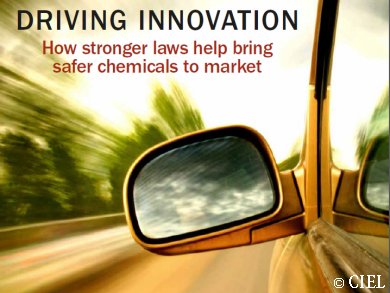The US House Subcommittee on Energy and Commerce held a hearing to discuss the “Regulation of New Chemicals, Protection of Confidential Business Information, and Innovation” under the 1976 U.S. Toxic Substances Control Act (TSCA). The Center for International Environmental Law (CIEL) was invited to make a submission. CIEL is a nonprofit organization that uses the power of the law to protect the environment, promote human rights and ensure a just and sustainable society.
CIEL performed a study which finds that stricter rules over hazardous chemicals inspire the innovation of safer alternatives and can pull safer alternatives into the market, enabling them to overcome barriers to entry. But, changes to TSCA sections 5 and 14 are necessary. To this end, CIEL presented the following recommendations to the hearing:
- Ensure the burden of proving chemical safety falls on chemical manufacturers for new and existing chemicals: Requiring that chemical manufacturers generate information about the intrinsic hazards of both existing as well as new chemicals. This information enables regulators to remove entrenched chemicals of concern, empowers downstream users to deselect hazardous chemicals from their supply chain, and equips chemical manufacturers to innovate towards safer alternatives.
Although recent progress has been made by countries around the world in placing the burden of proving chemical safety on chemical manufacturers, greater measures are needed in the United States. - Promote access to information about chemical hazards and exposures: Inventors need access to develop safer solutions and regulators need access to restrict the use of hazardous chemicals, enabling the entry of safer alternatives. Consumers and downstream users need access to information about chemicals in products throughout the supply chain to enable them to choose safer products, thereby incentivizing innovation toward safer alternatives. Policy makers should ensure that health and safety information is generated and made available to consumers, businesses, and regulators, including information on and awareness of products containing hazardous chemicals. Claims of confidentiality should be justified, periodically re-justified, and never granted for health and safety information to enable the development of safer alternatives.
- Phase-out chemicals with certain intrinsic hazards: U.S. EPA must possess—and exercise—the power to remove hazardous chemicals from the market based on their intrinsic hazards.
- Recognize endocrine disruption as an intrinsic hazard that cannot be soundly managed.
- Internalize the costs of hazardous chemicals.
- Craft stronger international laws to ensure a level-playing field for U.S. businesses: A broader international regime designed to cover a wider range of hazardous chemicals and chemical-related risks could help to create a level-playing field for American businesses operating in a globalized world.
- Center for International Environmental Law (CIEL), Washington D.C., USA
- Study: Driving Innovation – How stronger laws help bring safer chemicals to market, CIEL February 2013
- Listen to the Hearing at the US House Subcommittee on Energy and Commerce, July 11, 2013




